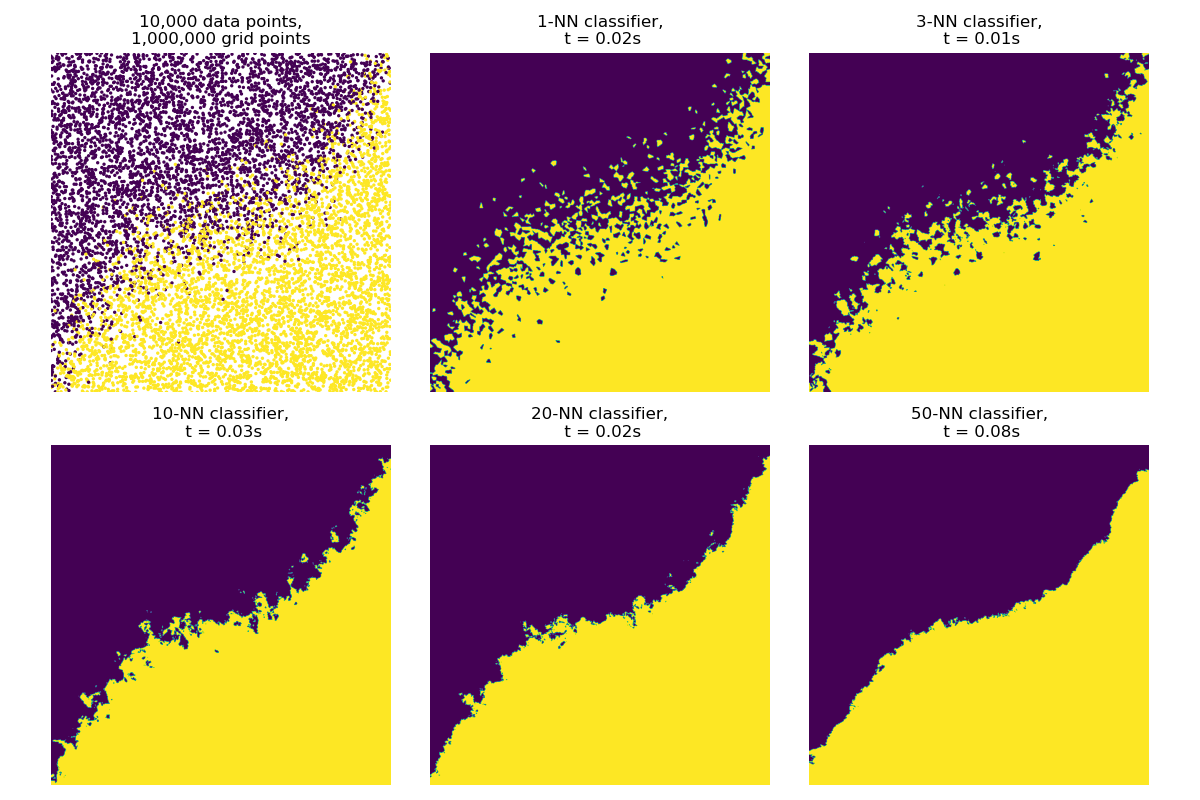Note
Go to the end to download the full example code
K-NN classification - PyTorch API
The argKmin(K) reduction supported by KeOps pykeops.torch.LazyTensor allows us
to perform bruteforce k-nearest neighbors search with four lines of code.
It can thus be used to implement a large-scale
K-NN classifier,
without memory overflows.
Setup
Standard imports:
import time
import numpy as np
import torch
from matplotlib import pyplot as plt
from pykeops.torch import LazyTensor
use_cuda = torch.cuda.is_available()
dtype = torch.cuda.FloatTensor if use_cuda else torch.FloatTensor
Dataset, in 2D:
N, D = 10000 if use_cuda else 1000, 2 # Number of samples, dimension
x = torch.rand(N, D).type(dtype) # Random samples on the unit square
# Random-ish class labels:
def fth(x):
return 3 * x * (x - 0.5) * (x - 1) + x
cl = x[:, 1] + 0.1 * torch.randn(N).type(dtype) < fth(x[:, 0])
Reference sampling grid, on the unit square:
M = 1000 if use_cuda else 100
tmp = torch.linspace(0, 1, M).type(dtype)
g2, g1 = torch.meshgrid(tmp, tmp)
g = torch.cat((g1.contiguous().view(-1, 1), g2.contiguous().view(-1, 1)), dim=1)
K-Nearest Neighbors search
Peform the K-NN classification, with a fancy display:
plt.figure(figsize=(12, 8))
plt.subplot(2, 3, 1)
plt.scatter(x.cpu()[:, 0], x.cpu()[:, 1], c=cl.cpu(), s=2)
plt.imshow(np.ones((2, 2)), extent=(0, 1, 0, 1), alpha=0)
plt.axis("off")
plt.axis([0, 1, 0, 1])
plt.title("{:,} data points,\n{:,} grid points".format(N, M * M))
for i, K in enumerate((1, 3, 10, 20, 50)):
start = time.time() # Benchmark:
G_i = LazyTensor(g[:, None, :]) # (M**2, 1, 2)
X_j = LazyTensor(x[None, :, :]) # (1, N, 2)
D_ij = ((G_i - X_j) ** 2).sum(-1) # (M**2, N) symbolic matrix of squared distances
indKNN = D_ij.argKmin(K, dim=1) # Grid <-> Samples, (M**2, K) integer tensor
clg = cl[indKNN].float().mean(1) > 0.5 # Classify the Grid points
end = time.time()
plt.subplot(2, 3, i + 2) # Fancy display:
clg = clg.view(M, M)
plt.imshow(clg.cpu(), extent=(0, 1, 0, 1), origin="lower")
plt.axis("off")
plt.axis([0, 1, 0, 1])
plt.tight_layout()
plt.title("{}-NN classifier,\n t = {:.2f}s".format(K, end - start))
plt.show()

Total running time of the script: (0 minutes 0.901 seconds)